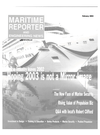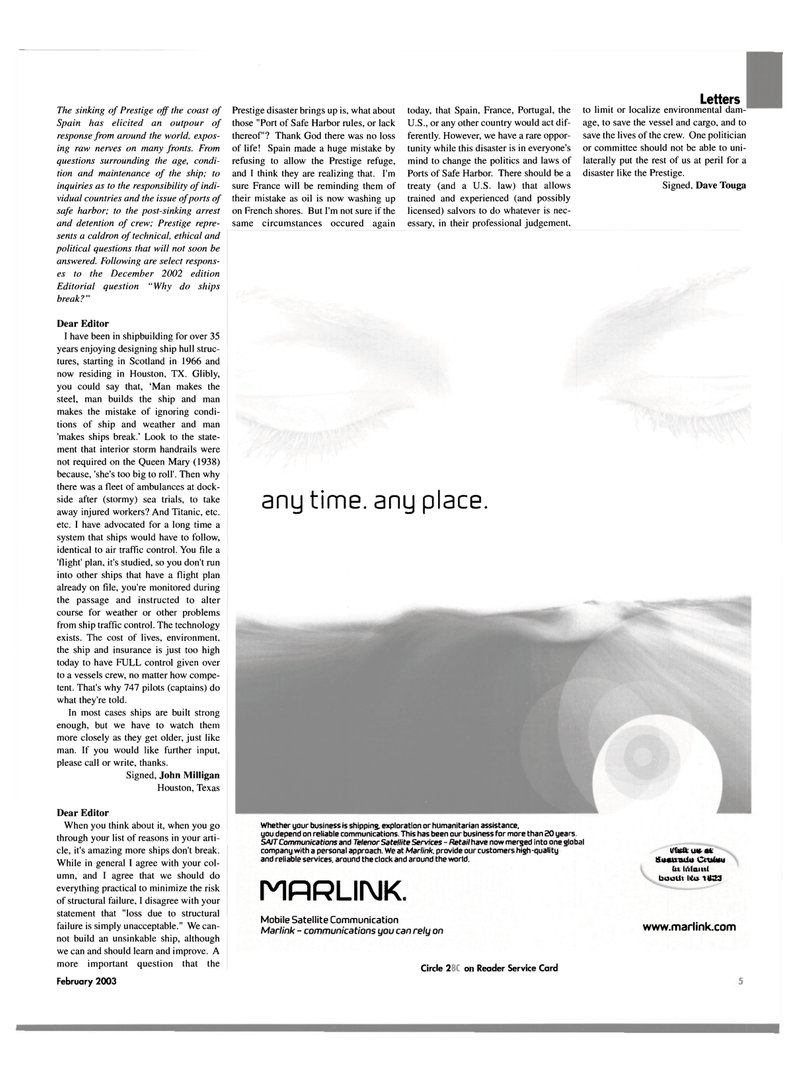
Page 5: of Maritime Reporter Magazine (February 2003)
Read this page in Pdf, Flash or Html5 edition of February 2003 Maritime Reporter Magazine
The sinking of Prestige off the coast of
Spain has elicited an outpour of response from around the world, expos- ing raw nerves on many fronts. From questions surrounding the age, condi- tion and maintenance of the ship; to inquiries as to the responsibility of indi- vidual countries and the issue of ports of safe harbor; to the post-sinking arrest and detention of crew; Prestige repre- sents a caldron of technical, ethical and political questions that will not soon be answered. Following are select respons- es to the December 2002 edition
Editorial question "Why do ships break?"
Dear Editor
I have been in shipbuilding for over 35 years enjoying designing ship hull struc- tures, starting in Scotland in 1966 and now residing in Houston, TX. Glibly, you could say that, 'Man makes the steel, man builds the ship and man makes the mistake of ignoring condi- tions of ship and weather and man 'makes ships break.' Look to the state- ment that interior storm handrails were not required on the Queen Mary (1938) because, 'she's too big to roll'. Then why there was a fleet of ambulances at dock- side after (stormy) sea trials, to take away injured workers? And Titanic, etc. etc. I have advocated for a long time a system that ships would have to follow, identical to air traffic control. You file a 'flight' plan, it's studied, so you don't run into other ships that have a flight plan already on file, you're monitored during the passage and instructed to alter course for weather or other problems from ship traffic control. The technology exists. The cost of lives, environment, the ship and insurance is just too high today to have FULL control given over to a vessels crew, no matter how compe- tent. That's why 747 pilots (captains) do what they're told.
In most cases ships are built strong enough, but we have to watch them more closely as they get older, just like man. If you would like further input, please call or write, thanks.
Signed, John Milligan
Houston, Texas
Dear Editor
When you think about it, when you go through your list of reasons in your arti- cle, it's amazing more ships don't break.
While in general I agree with your col- umn, and I agree that we should do everything practical to minimize the risk of structural failure, I disagree with your statement that "loss due to structural failure is simply unacceptable." We can- not build an unsinkable ship, although we can and should learn and improve. A more important question that the
February 2003 7
Prestige disaster brings up is, what about those "Port of Safe Harbor rules, or lack thereof"? Thank God there was no loss of life! Spain made a huge mistake by refusing to allow the Prestige refuge, and I think they are realizing that. I'm sure France will be reminding them of their mistake as oil is now washing up on French shores. But I'm not sure if the same circumstances occured again today, that Spain, France, Portugal, the
U.S., or any other country would act dif- ferently. However, we have a rare oppor- tunity while this disaster is in everyone's mind to change the politics and laws of
Ports of Safe Harbor. There should be a treaty (and a U.S. law) that allows trained and experienced (and possibly licensed) salvors to do whatever is nec- essary, in their professional judgement.
Letters to limit or localize environmental dam- age, to save the vessel and cargo, and to save the lives of the crew. One politician or committee should not be able to uni- laterally put the rest of us at peril for a disaster like the Prestige.
Signed, Dave Touga any time, any place.
Whether your business is shipping, exploration or humanitarian assistance, you depend on reliable communications. This has been our business for more than 20 years.
SAIT Communications and Telenor Satellite Services - Retail have now merged into one global company with a personal approach. We at Marlink. provide our customers high-quality and reliable services, around the clock and around the world.
MRRLINK,
I'Muwu
S aau iulu Ctuteu lu li'iiaiut booth l<« 1U33
Mobile Satellite Communication
Marlink - communications you can rely on www.marlink.com
Circle 264 on Reader Service Card

 4
4

 6
6
